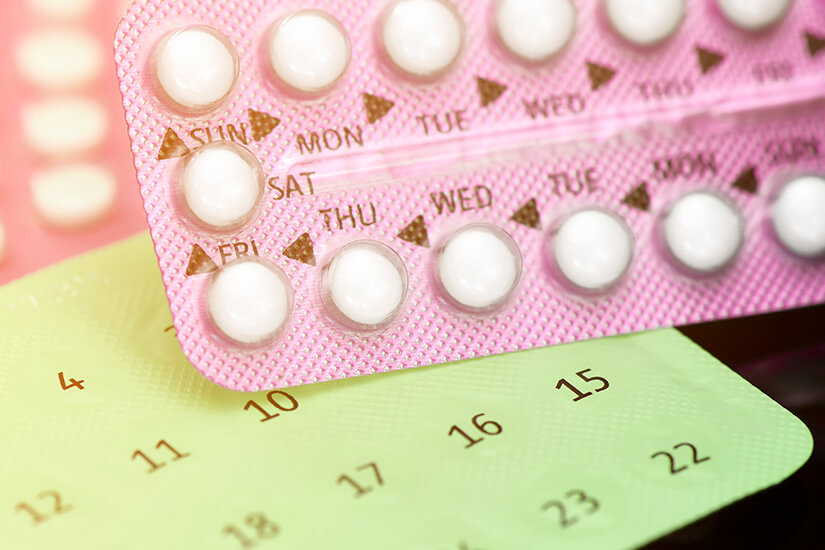In this blog Coni Longden-Jefferson asks: Does the pill affect fertility? When looking at preconception planning, understanding your cycle is important. But what if hormonal contraception means you don’t have an organic cycle?
Coni Longden-Jefferson talks about missing her period after a decade without it, and speaks to leading Gynaecologist Dr Jess Farren to get the facts about contraception and fertility.
The pill and fertility – my story
My early experience of periods, contraception and wondering if the pill affects fertility, Coni
Having spent my childhood fearing it, my teenage years moaning about it and my twenties revelling in the lack of it, now, as I approach thirty, I find myself missing it. No, I’m not talking about homework, or being shouted at by my parents. I’m talking about my period.
I started my period age 11, to the fanfare of mum rushing out to purchase sanitary towels, black knickers and cheesecake – the holy trifecta of pre-teen menstruation. Whilst I was young, I was lucky enough to have a pretty regular cycle, a light flow and I never had to miss a day off school due to horrific cramps, like many of my friends did. I managed just fine, but show me any young girl who says she looks forward to her monthly visitor and I’ll show you a liar.
Like most teenage girls, once I became sexually active, I experimented with different forms of contraception, from the depo injection to some rather questionable glow in the dark condoms. However, by age 18, I had discovered that progesterone only contraception was definitely the best suited to my body. I had minimal side effects, avoided the huge mood swings I had personally been subject to when on the combined pill and – bonus – I didn’t have a period.

It’s worth mentioning that some women do have periods or spotting while on this pill, and some people have absolutely no side effects on the combined pill. The trial and error of contraception is all about finding a solution that works for you and in the POP I found mine.
A happy bleed-free year
I spent many a happy practically bleed-free year on the mini pill, and more recently, ahead of three months of travelling, I moved on to the hormonal implant. I didn’t trust myself not to lose my pills whilst away and figured the chances of getting my hands on some spare Cerazette in Borneo would be slim to none. Something securely nestled in my arm seemed like the most sensible option.
2 years on, and the implant and I are still getting on well – pregnancy scares zero and side effects minimal. I can’t say that it’s not keeping up its end of the bargain. However, despite this, I find myself considering breaking up with it, in your classic ‘it’s not you, it’s me’ move. The thing is, I’ve started to miss having my period. Now, no one is more surprised than me at this sudden desperation for menstruation, but it’s true. To paraphrase the Jackson Five – I want it back.
It’s strange to realise that my body has been in an artificial hormonal state for over 10 years. Who am I when I’m not pumped full of progesterone? Is this really my natural body shape? Is this even my actual personality? Did I really enjoy that third Bridget Jones movie? This lack of connection to my body and sense of self has made me think it might be time to step away from long term or hormonal contraception for a while. Of course this could mean doing the dance with the devil, trying not to get pregnant whilst using natural contraception (or could always go back to the aforementioned glow in the dark condoms I suppose).
Some wisdom with age and body knowledge
As I’ve gotten older, I’ve become more aware of my own body and my health is considerably more important to me than it was in my student days. I’m more in tune with the signs my body gives me when I need to slow down or if I’m about to get sick – and nowadays I actually tend to take heed of their warnings. So reaching this point in my life, where I’m finally ready to listen to what my body has to say, seems a little ironic when I don’t currently have one of the key regular indicators of female health.
But there is also a more pertinent reason behind my recent desire to be at one with my menstrual cycle. Because, whilst I am certainly not ready to become a parent just yet, the prospect of motherhood is now a ship close enough to dock, rather than a tiny spec on the horizon. I am in a loving, committed relationship and children are definitely something we both hope will be part of our future together.
In lieu of my body giving me any clear answers and with the ticking of my biological clock just getting that little bit louder, I wanted to speak to gynaecologist Dr Jess Farren about my concerns. I also wanted to know how does the pill affect fertility, which is something you hear women talk about anecdotally – but I wanted to better understand the science.
Jess – Can not having a period for an extended period of time increase the risk of infertility or general health issues?
In a word – No!
Some women get understandably concerned that it is unhealthy not to shed the lining of your womb each month. However, the way the pill works is by keeping the lining of the womb in a thin, quiet state – so there is nothing that ‘needs’ shedding. I often explain to my patients that our ancestors spent most of their lives either pregnant or breastfeeding – and so didn’t have anywhere near as many periods as we do.
Not having a period because you are on contraceptive pills is a healthy state to be in, and may reduce your risk of iron deficiency anaemia (as you are not bleeding at all, or as heavily). It can also reduce the risk of endometriosis, and ovarian cysts.
What about the other health risks? What is the safest birth control?
Birth control is generally VERY safe. However, there are some risks with hormonal contraception. It is important to remember that any hormonal contraception is much much safer for you than a pregnancy – either one you choose to continue with, or one you terminate.
In pregnancy, your own body produces the same types of hormones that are in contraception – but to a much higher level. This means the risks associated with the hormones are higher.
For example, one of the risks you’ll hear about from the combined pill is blood clots. Depending on the type of pill you are on, the risk of suffering a clot (which can be life-threatening) is up to 12 in 10 000 women per year. This compares to 2 in 10 000 in women not on the pill (so a higher risk) but 29 in 10 000 (i.e more than three times higher) in pregnancy.
Some cancers also appear to be slightly more common in women exposed to hormonal contraceptives (including breast cancer), whereas others appear to be slightly less common (such as womb, ovarian and colon cancer).
It is really important to explore these risks carefully with a healthcare professional. Your individual risks may be affected by other medical conditions, your weight, whether you smoke, or if you have a family history of cancers at a young age. You need to have all the information so you can decide what feels acceptable to you.

So, does the pill really affect fertility?
No! In fact, a study in 2002 showed that prolonged use (more than 5 years) of the combined pill was associated with a lower risk of delays to conception! There really is no evidence that the pill affects fertility.
There is absolutely no evidence that any of the pills reduce fertility.
Actually, these are ways that long term use may improve fertility:
- By keeping any endometriosis at bay – therefore reducing scarring and tubal blockage
- By minimising the risk of ovarian cysts (combined contraceptives only): these can occasionally be very large, or rupture, meaning surgery is needed. And any surgery to the ovaries may reduce the amount of healthy ovarian tissue left to release eggs from.
- By minimising unwanted pregnancies (and therefore also ectopic pregnancies, and terminations – both of which may negatively affect future fertility)
- They may possibly result in less growth of fibroids (which, if large, can affect conception and pregnancy)
The only way the pill could conceivably be bad for your long term fertility is if, by using it instead of a condom, a woman were to put herself more at risk of sexually transmitted infections such as chlamydia. To avoid this risk, we would recommend using a condom in addition to the pill with a new partner, at least until you have both had sexual health checks.
Does any kind of birth control affect fertility?
The contraceptive injection may cause a bit of a delay in getting pregnant. The injection is supposed to protect you from pregnancy for up to three months, but it seems that on average women take a further five months to conceive. This is because it takes a while for it all to work its way out of your system.
For all other hormonal contraceptives, the circulating amount of hormone in your bloodstream drops to normal almost immediately on removal (of the implant or coil) or stopping (pills), and there is no evidence for any significant delay to conception.
To point out the obvious – sterilisation will clearly have a long term impact and is very tricky (if not impossible) to successfully reverse.
Can the pill impact your mood?
Yes – it can. Pills (and the implant, and Mirena) usually stop you from ovulating, and this means you don’t have the fluctuations in hormones associated with a natural cycle. This includes pre-menstrual syndrome, and most people find being on contraception overall makes their mood more stable and therefore easier to manage.
Having said that, a minority of women find hormonal contraception does negatively affect their mood. The only way to know is to try it and keep tabs on how you’re feeling for a month or two after starting. If one type seems to be making you feel low, then it is usually worth discussing with a doctor and trying another type, as most people can find something that suits them perfectly.
Are there benefits of taking a break from contraception? Or is consistency better for your health?
There are no benefits to taking a break – except in putting your mind at ease.
There are no particular health benefits in consistency either, though you may find that it takes a little while to regain control of your bleeding pattern (or for bleeding to stop) after you have a break.
Are they any other indicators of fertility issues, that people not having period could look out for?
It’s useful to think of being on the pill as just putting your baby-making bits to sleep for a while. You can wake it up whenever you want to – but you’re not going to get an enormous amount of information about it while it’s sleeping! Resting it while you don’t need it may actually be a good thing for your long term reproductive health, and there’s certainly no evidence that it is bad.
You can, of course, take a break – or you can think back to what your periods were like before you started. Having had irregular periods prior to being on the pill, or issues with weight gain or acne, or a family history of polycystic ovarian syndrome (PCOS), may make it more likely that you have PCOS, which can have implications for fertility. Being on the pill will mask your irregular periods, but this will return when you stop.
Having had very painful periods off the pill may make endometriosis more likely – but being on the pill until you are ready to conceive is the best thing to keep this, and any resulting scarring in your abdomen, at bay.
Feeling reassured and looking ahead
Jess’s expert insight has definitely answered some of the burning questions I had about how the pill or contraception affects fertility (or more specifically, how it doesn’t) and I am certainly feeling more confident in the fact that my hormonal implant is only stopping me getting pregnant in the short term.
However, there was something she said that resonated with me – that the only benefit of taking a break from contraception is to put my mind at ease. Whilst there may be no direct physical benefit from stepping away from the hormones for a while, reducing stress and anxiety can only be a positive thing when you are starting to think about preparing your body for motherhood, even if it’s not on the cards for another few years. I have a feeling I could be taking the plunge with non-hormonal contraceptives and throwing a welcome back party for my period one day very soon.





